Is Peanut Butter Good For You? 20 Effects of Eating It
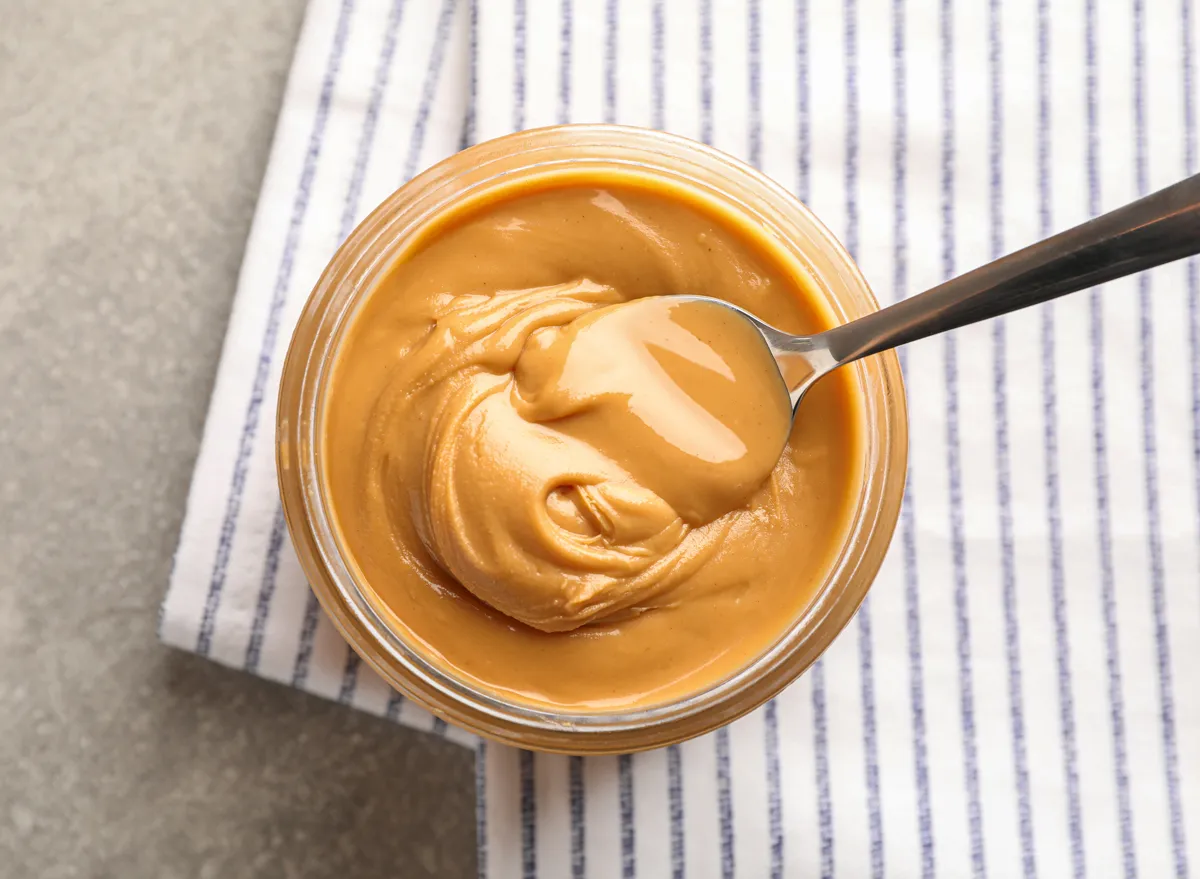
There are about as many styles, brands, and fresh, locally ground tubs of peanut butter on the market as there are creative ways to eat the sticky stuff. And not all kinds are as good for you as others.
Same goes for those creative eats, like a sandwich known as “the Elvis.” The King’s signature snack featured two slices of white bread spread thickly with creamy peanut butter, topped with mashed banana, occasionally some jelly, dressed with four strips of bacon, and fried in butter. Legend has it that Elvis first encountered the gooey concoction after a 1976 concert at a diner that served something called the Fools Gold Loaf, made from a full loaf of sourdough bread, a pound of bacon, a jar of peanut butter and a jar of jelly. Calorie count: approximately 8,000.
Presley died at 42 of a heart attack linked to his barbiturate habit, supposedly not his penchant for fried PB&B&B sandwiches.
A fair source of protein (7 grams) and mostly healthy monounsaturated and polyunsaturated fats (just 3.5 grams are saturated), peanut butter is a nutritious and inexpensive food with some surprising health benefits. But peanut butter has some downsides, too. Read on to determine if eating an Elvis, sans the cured meat perhaps, is right for you.
13 Benefits of Eating Peanut Butter:
1. You may lose weight.
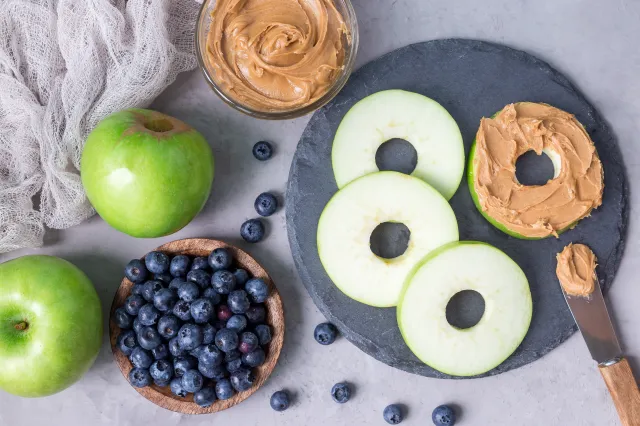
Peanut butter is rich in two macronutrients that digest more slowly than carbohydrates—protein and fat. “The protein (7 grams per 2 tablespoons) keeps you full for a longer period, so you won’t pick up random snacks throughout the day,” says Katherine Gomez, RD, a registered dietitian with clinical nutrition and research experience in major hospitals, an a medical reviewer for Psychemag. Studies show that protein is the most effective of the macronutrients at reducing levels of grehlin, the so-called hunger hormone. In one study in the American Journal of Clinical Nutrition found that overweight woman who increased their intake of daily protein intake by 15% consumed 441 fewer calories daily without consciously trying to restrict eating.
2. Peanut butter may help your heart.
“For a plant-based food, peanuts are high in coenzyme Q10, an antioxidant that’s important for energy and good heart health,” says Josten Fish, RDN, owner of Dietitian Meets Mom. Research has found that people with heart problems improve symptoms and lower blood pressure with greater levels of CoQ10. Your body naturally produces the antioxidant, but production decreases as you age. You can increase your intake by eating nuts, fish, and meat or taking dietary supplements. Peanut butter is also high in monounsaturated fats that can help reduce levels of LDL “bad” cholesterol in your blood, which can lower your risk of heart attack and stroke.
3. You may build more muscle.

After age 30, your levels of testosterone begin to wane and as a result lean muscle mass decreases; this age-related loss of muscle is called sarcopenia, says endocrinologist Florene Comite, MD, founder of Groq Health, a telemedicine app designed to reverse aging and combat chronic disease. “It’s critical as we age to eat more protein (like nuts, eggs, and fish) and do strength-training exercise.”
Peanut butter makes an excellent pre- or post-workout snack because of its protein content, which will support muscle growth.
For more muscle foods, read The Best Foods for Stronger Muscles After 50.
4. It may help ease muscle pain.
If you take cholesterol-lowering drugs called statins, you may want to make yourself a PB&J. Patients on statins are often told by their doctors to start supplementing with CoQ10 because it eases the mild to moderate muscle soreness associated with taking the drugs. In one study, 50 patients who were taking statins and reported muscle pain were split into two groups. One group of 25 received coenzyme Q10 supplementation for 30 days while a control group took a placebo pill. The result showed that CoQ10 supplementation reduced muscle pain in 75% of the patients.
5. You’ll get the nutrition of beef without eating red meat.
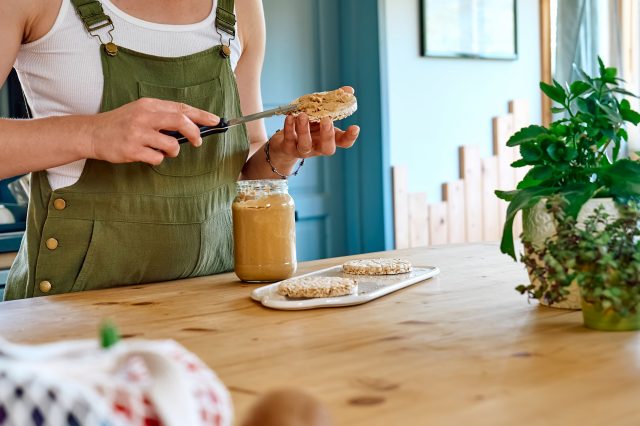
You get 22.21 grams of protein in 100 grams of peanut butter compared to 24.85 grams in the same amount of steak, and about the same amount of vitamins and minerals. Peanut butter contains more calcium, magnesium, phosphorous, potassium, copper, vitamins B1 and B3 and Folate. Peanut butter is richer in fats, too, 51 grams to steak’s 19, but the majority are the healthier mono- and poly-unsaturated fats.
6. You may side-step a stroke.
Peanuts and peanut butter aren’t as popular in Japan as they are here in the states. But that may change after a Japanese study found that people who are just four to five peanuts a day had a 16% lower risk of having any type of stroke. The risk reduction for a blood clot-related stroke rose to 20% during the study, the researchers reported in the American Heart Association’s journal, Stroke. The nutrients in peanuts, specifically monounsaturated fatty acids, polyunsaturated fatty acids, minerals, vitamins and dietary fiber, “help by reducing risk factors, including high blood pressure, and high blood levels of ‘bad’ cholesterol,” lead study author Satoyo Ikehara said in a news release.
7. You may reduce chronic inflammation.
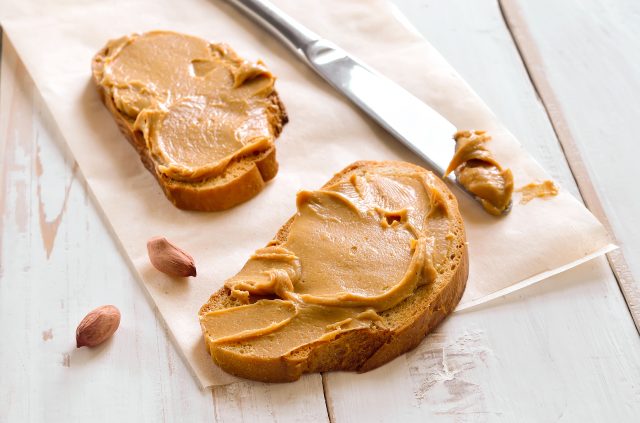
Those same nutrients that are beneficial for stroke reduction are known to combat chronic low-grade inflammation, Ikehara says. Magnesium, which is found in peanuts and peanut butter, is one of them. A 2022 meta-analysis of studies in Nutrients found that supplementing with magnesium significantly reduced chemical markers of chronic inflammation, particularly, CRP, C-reactive protein, which is produced by the liver and rises when there is inflammation throughout the body.
8. You may beat diabetes.
Natural peanut butter made without added sugars is a low-glycemic food, meaning it won’t spike blood sugar levels.
“Peanut butter is helpful for people who need to manage their blood sugar levels, as the protein, fat, and fiber work together to slow down how quickly the body absorbs carbohydrates into the bloodstream,” says registered dietitian Stephanie Wells, MS, RD, owner of Thyme to Go Vegan Nutrition Services.
A small study in 2018 demonstrated that eating a few tablespoons of peanut butter may reduce the blood glucose spike you would get after having a high carbohydrate meal. For example, in the study, researchers tested the blood glucose of participants after they ate two slices of white bread and an apple juice for breakfast. The next day, subjects at the same meal with the addition of 2 tablespoons of peanut butter and the blood test was repeated. The researchers found that the peanut butter significantly lowered participants blood glucose compared to results from the first day’s meal without peanut butter.
9. You’ll bolster your brainpower.
Studies show that a diet high in monounsaturated fats like those found in peanut butter boost the production of a neurotransmitter called acetylcholine, which is important for learning and memory. Low levels of acetylcholine have been linked to memory problems and Alzheimer’s disease. Other research suggests that eating nuts has an effect on brainwave activity, improving cognitive processing, recall and memory.
10. A scoop of peanut butter can clobber your cravings.
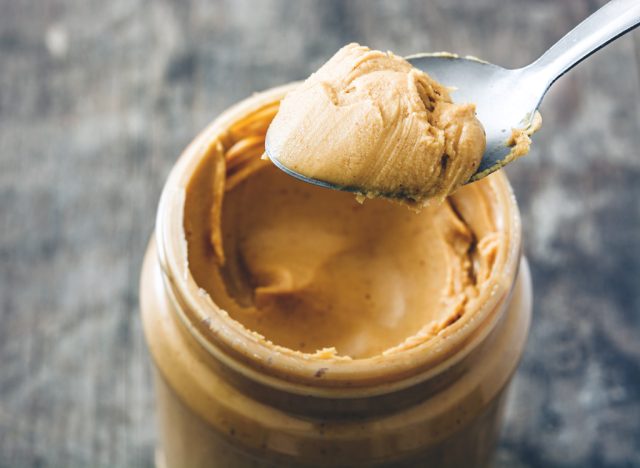
Try it—next time your belly is growling an hour or two before lunch, slather some peanut butter on a few slices of apple. Eat. See how you feel. Peanut butter’s protein will keep those cravings for doughnuts away until you reach lunchtime, and you may even consume fewer calories at lunch. Just as a hard-boiled egg is a terrific craving crushing snack, so is peanut butter.
“Each serving of peanut butter has around the same amount of protein in one egg,” says registered dietitian Amy S. Margulies, RD, CDCES, a registered dietitian and certified diabetes care and education specialist and owner of The Rebellious RD. “Peanut butter is also a low-cost protein, so a budget-friendly choice as well.”
11. You may get a better night’s sleep.
If you’re tossing and turning and can’t get to sleep, try a tablespoon of peanut butter. Peanuts are a healthy source of tryptophan, an amino acid that helps improve sleep quality. Research has shown that tryptophan is critical to the production of the calming hormone serotonin and the natural sleep hormone melatonin.
12. It’s great nutrition for older adults.
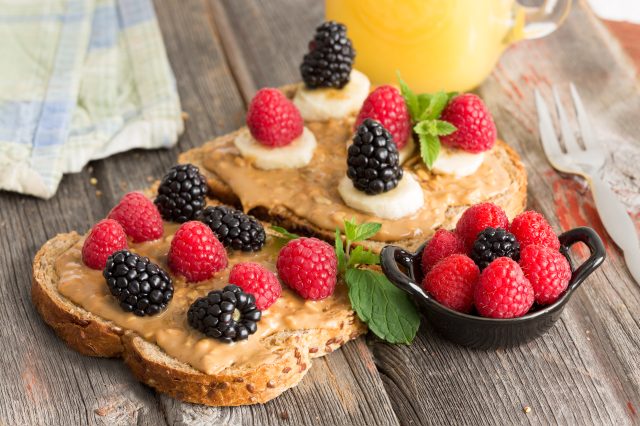
The high calorie content of peanut butter can be a downside if you’re watching your weight. But if you need to gain weight, this calorie-dense food can be an easy, and delicious, way to add calories. “It’s also a good option for people who have poor appetites, such as older adults or cancer patients, who need easy strategies for adding calories,” says Wells.
13. It may protect against cancer.
If you practice portion control, peanut butter is a food that offers a great number of health benefits, including heart health, weight management due to its high protein and fiber content, and blood sugar control. “Peanut butter is also nutritionally dense, rich in several important nutrients like vitamin E, magnesium and potassium,” says Barbara Kovalenko, RD, a registered dietitian with Lasta. All these benefits may play a role in cancer prevention, too, she says. “Some studies have suggested that consuming peanuts and peanut butter may be associated with a reduced risk of certain types of cancer, such as colorectal cancer,” says Kovalenko.
For example, a 2021 meta-analysis of observational studies in Advances in Nutrition examined total nut, tree nut, peanut and peanut butter consumption and dose-response associations with risk of cancer and mortality. The research determined that a total nut increase equivalent to a teaspoon of peanut butter daily was associated with a 4% lower risk of cancer mortality, and 6% and 25% lower risks of pancreatic and colon cancers, respectively.
Is peanut butter bad for you? 7 possible negative effects of eating it.
1. It could raise your blood sugar.
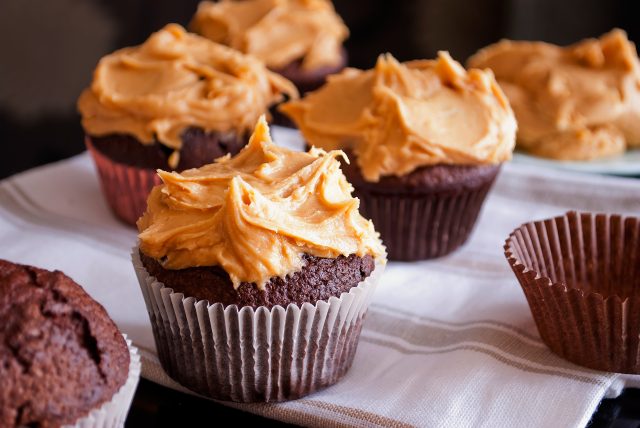
“Some peanut butter varieties, like honey roasted versions, contain a lot of added sugar,” warns Catherine Karnatz, RD, a registered dietitian in Hampton, Virginia. That can raise your blood glucose and may lead to insulin resistance. “Over time, eating too many added sugars may put you at a greater risk for developing type 2 diabetes, and cavities.” Karnatz recommends choosing peanut butter brands that contain less than 5 grams of sugar per serving to keep your blood sugar levels in balance. Natural peanut butter usually contains just two ingredients, peanuts, and salt.
2. Too much may make you nutrient deficient.
“If someone were relying on peanut butter as their primary source of protein and fats, they could miss out on a variety of minerals,” warns Fish. “For example, peanut butter is low in the essential amino acid methionine. Methionine is called “essential” because our bodies don’t make it; we need to get it from food. It’s a building block protein responsible for many functions in the body. But since it’s found only in meat, fish, and dairy products, vegetarians may not get enough. Eating peanut butter wouldn’t provide an adequate amount. Supplement your diet with oats, quinoa, and sunflower seeds, which have higher amounts.
3. It may make you bloated.

Protein is the most difficult of macronutrients for the body to digest, so overeating it can cause digestive distress, like bloating and gas, says Gomez.
4. You might put on weight.
At 200 calories per 2-tablespoon serving, peanut butter is not a low-calorie food, so overeating it on a regular basis is likely to contribute to weight gain, says Margulies. “Don’t assume a ‘low-fat’ peanut butter is healthier,” she says. “The fat in peanut butter is a healthy fat, but when fat is removed, sugar may be added in its place. And some brands also add hydrogenated oils.”
5. You may get more unhealthy additives.
“Not all peanut butter is created equal,” says Trista Best, RD, a registered dietitian at Balance Once Supplements. Even the best brands can contain added sugars and hydrogenated fats and other concerning ingredients, so it’s important to read nutrition labels and scrutinize the ingredients list. Even the name of the product can tip you off. Consider, Jif Natural Creamy Peanut Butter Spread. “The keyword is ‘spread’ because it is not 100% peanut butter,” says Best. “This product is using the word ‘natural’ very loosely, giving the idea that it is the same as creating your own peanut butter with whole nuts.”
Like many other peanut butter products, it contains added sugar, palm oil and molasses. While preferable to trans fats, palm oil contains saturated fatty acids, high amounts of which have been linked to coronary artery disease; added sugars have been shown to increase risk of cardiovascular disease, as well.
6. It could trigger anaphylaxis.

“Peanut butter is generally safe to eat in moderation, but for some people, it can cause allergic reactions,” says Kieran McSorley, RD, chief operating officer of Brentwood Physio Calgary. The reaction can be mild or severe, called anaphylaxis, and cause the person to have difficulty breathing.
7. There’s a small risk of potential exposure to mold contamination.
A fungus called aflatoxin often grows on crops like peanuts during storage and processing in most parts of the world. Consuming peanut butter contaminated with this mold could cause liver damage, including liver cancer and liver failure, as it has in places like Kenya. “However, this is generally not a concern in the United States,” says Kovalenko. “Regulations and quality control measures are in place to prevent such contamination.”









